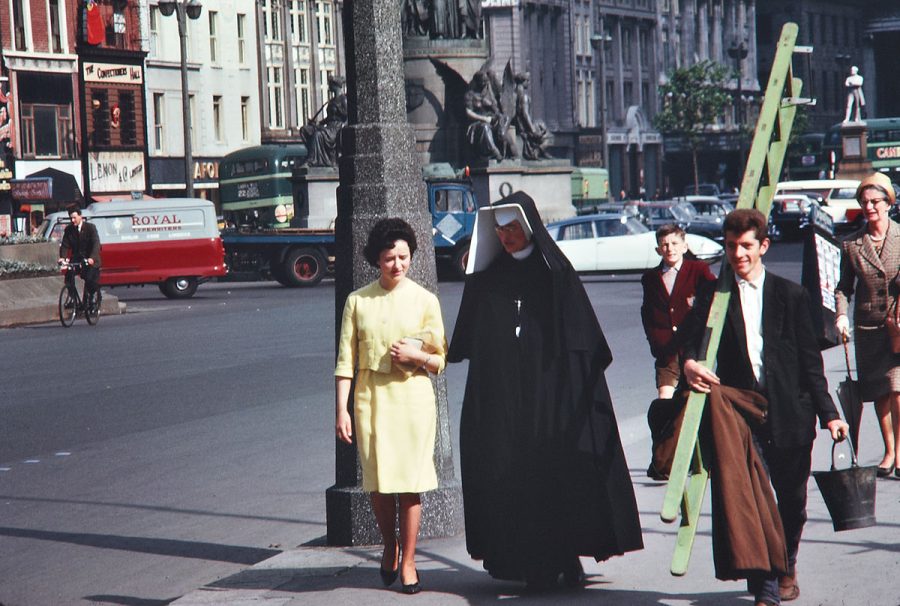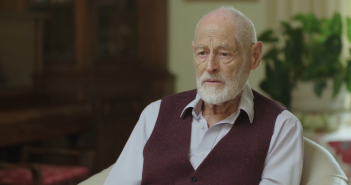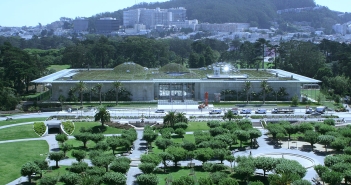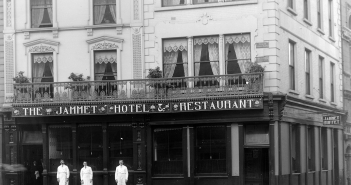Fifty years ago a politician published a manifesto which, if implemented, would have changed the nature of Irish society, would have defied the ethos of contemporary political culture and would have spared us so much of the misery caused by the recent crisis.
(Vincent Browne ‘Remembering when Fine Gael flirted with a left-wing agenda’, Irish Times, February 12th, 2014)
As a young man I was an admirer of the former President of the High Court, Attorney General and architect of Fine Gael’s Just Society, Declan Costello. I was then privileged to engage with him on an informal basis, appearing before him in court on a number of occasions. He was a complex and often divisive figure, and I disagree profoundly with many of his judgments, but there is no doubting the profundity of the intellect.
He was one of the most impressive public speakers I have seen in action. It was a marriage of content and rhetoric abetted by a dry – very dry – sense of humour, albeit his diction was marred by a faintly detectable lisp. He was a remarkably civilized human being – a petite mannequin – whose pristine intellect was ill-suited to the rough and tumble of Irish politics.
Born into a Fine Gael dynasty – as the eldest son of Taoiseach and barrister John A. Costello – he seems to have cut a dash as a young man. According to one story, Jackie Beauvoir (future Kennedy-Onassis) became infatuated with what would have been a slightly frail young man – he recovered from a bout of tuberculosis in his teens – after they met on her visit to Ireland in 1950.

An unlikely match.
I suspect she would not have had to worry about a husband having affairs with the likes of Marilyn Monroe if the match with Declan had borne fruit.
The curse of hereditary connection is a disease that afflicts Ireland. A privileged few families have dominated power and patronage throughout the history of the state, with the GPO in 1916 Rising acting as an Irish Mayfair. W.B. Yeats presciently described his fellow Senators in the 1920s in the following terms: ‘hot and vague, always disturbed always hating something or other … [they]had … signed the death warrant[s]of their dearest friend[s]… Yet their descendants, if they grow rich enough for the travel and leisure that make a finished man, will constitute our ruling class, and date their origin from the Post Office as American families date theirs from the Mayflower.’
Reference to an Irish ruling class recall a remark that Aneurin Bevin made of Anthony Eden that for all his apparent sophistication, he had the unplayable stupidities of his class and type. The charge of stupidity could not be levelled against Declan Costello, who, despite his flaws, sought to remould Ireland along Christian Socialist lines. Sadly, despite being one of the richest countries in Europe, almost three quarters of a million Irish people were still living in poverty in 2019, a figure that seems likely to rise in the months and years to come.
I remember Paddy McEntee once referring to him once as a cold fish. I am not so sure. Dispassionate might be a better description. Anyway I’d be more inclined to trust someone with Declan Costello’s detachment than the kind of avuncular, back-slapping figure that one often encounters in Ireland.
Declan Costello was legendary for his work ethic, which perhaps compensated for an obvious social awkwardness. His practised remoteness even seemed to extend to his fellow judges at social gatherings.
‘Fine Gael: Social Democratic Party’
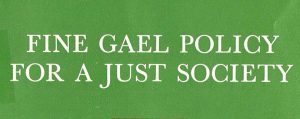
Declan Costello will always be associated with the authorship of the Just Society document in 1966 that set out the ideals of the Christian Socialist movement which he promoted within the party.
Despite being clearly at variance with the current neo-liberal hegemony this tradition occasionally crops up in debates within Fine Gael. Notably, during the leadership debates in 2017 Simon Coveney implausibly differentiated himself from Leo Varadkar by claiming to represent it.
The document speaks of ‘the very wide areas in our society where great poverty exists, poverty which is degrading and capable of remedy, to appalling social conditions.’
And, ‘We are not living in a just society. This fact must be understood and complacency must be dispelled and enthusiasm created to remedy the social injustices in our midst.’
Fine Gael, it was said, sought ‘office to work towards a society in which freedom and equality are not concepts from an academic textbook but are expressed in real and tangible conditions which all our people can enjoy.’
However, in February 1967, having served as T.D. for Dublin North-West, Declan Costello announced his retirement from the rough and tumble of politics. But the ideals of the Just Society were carried on by ideological fellow travellers such as his brother-in-law Alexis FitGerald, Michael Sweetman, Jim Dooge and Garret Fitzgerald.
FitzGerald went on to become an unsatisfactory two-term Taoiseach in the 1980s. During this period a new kind of party crystallised, influenced by the Progressive Democrats, with figures like John Bruton coming to the fore, that adopted a laissez faire approach at variance with the Keynesianism of the previous generation.
Remarkably, the Fine Gael party was on the brink of changing its name to ‘Fine Gael: Social Democratic Party’ at the 1968 Árd Fheis. Apparently the majority in attendance were in favour of the motion but the coup was resisted on a technicality by the old guard.[i]
Looking back on the period Vincent Browne recently recalled:
I was one of those beguiled by that at the time, believing that a right-wing party, such as Fine Gael, could be hijacked by a left agenda and be transformed via a procedural, albeit unintended, ambush. The ambush occurred at a time when Fine Gael felt self-conscious about standing for nothing and offering no alternative to a resurgent Fianna Fáil led by Seán Lemass.
Since then the conservative faction of large farmer and comfortable professionals serving multinational corporations has assumed pre-eminence. The party now led by Leo Varadkar is distinctly neo-liberal, with concessions to individual rights. The pole opposite of Declan Costello’s political credo.
Yet senior members of the party do continue to claim allegiance to the Just Society. The current Minister for Finance Paschal Donohoe, who has been elected to the same constituency as Declan Costello seat, claimed in 2017 that he possessed a copy of the document and that ‘he [Leo Varadkar] values the just society as much as I do and places its spirit in a modern, outward-looking and dynamic Ireland.’
Judicial Appointment
Like many of his contemporaries Declan Costello was a devout Catholic, which informed the noblesse oblige of the Just Society. Under Garret Fitzgerald and beyond, however, Fine Gael diverged from Costello’s ideals, embracing a socially liberal approach on issues such as contraception, marriage equality, and finally abortion, but an increasingly non-interventionist approach to the economy. This was anathema to Declan Costello’s moral outlook. His religion foregrounded a Christian Socialism that presaged John Rawls’s theory of justice as fairness, but also brought an overly moralistic approach to the private lives of individuals.
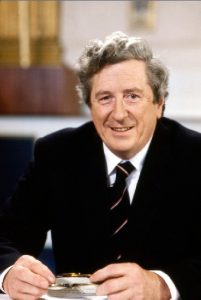
Former Taoiseach Garret FitzGerald.
The conversion of Fine Gael from authoritarian conservatives to social liberals has, however, been cosmetic, even under Garret Fitzgerald. It is clear that a neo-liberal consensus began to emerge in the wake of Fianna Fail’s landslide election victory in 1979, and individual rights gradually took the place of social supports as policy planks.
Declan Costello was appointed a High Court judge in 1977 having served as Attorney General under Liam Cosgrave. Owing to the tribalism bedevilling Irish politics successive Fianna Fail administrations. ignored his undoubted abilities as a jurist, passing him over for appointment to the Supreme Court.
This diminished his opportunities for progressive judicial leadership. Only towards the end of his career was he appointed to the largely administrative position of President of The High Court. But by that stage, frankly, the arteries had hardened and the reforming zeal that marked his earlier life had ebbed away.
Socio-Economic Rights
Costello’s judicial record on socio-economic questions is in marked contrast to his political career. The case of O’Reilly v. Limerick Corporation 1989 ILRM 181 suggests he had caved into a prevailing neo-liberal mindset of laissez faire. He claimed the Courts had no business allocating or redistributing resources, which was, he argued, a matter for the Dáil in Leister House alone.
The plaintiff Travellers sought a properly serviced halting site in order to vindicate their constitutional rights under Articles 40.3 and 41.2. Costello refused to grant it on the basis that such an order would involve:
[T]he imposition by the Court of its view that there has been an unfair distribution of national resources. To arrive at such a conclusion, it would have to make an assessment of the validity of the many competing claims on those resources, the correct priority to be given to them and the financial implications of the plaintiffs’ claim.
This appears to contradict his stated view that the Irish Constitution was informed by natural law, which in the Thomistic tradition encompasses fundamental socio-economic rights. Importantly, he recanted the O’Reilly decision a few years later in the case of O’Brien v Wicklow UDC 1994.
But damage had been done with his introduction of a neat Aristotelian distinction between commutative and distributive justice. This absolves the courts from any role in ensuring that elected representatives maintain basic standards of living – so elegantly articulated in the Just Society and also expressed in Article 45 of the Constitution – which underpins any true republic.
This argument was seized on by the libertarian Adrian Hardiman in the case of Sinnott v. Minister for Education 2001 IESC 63, to dismiss the claims of the intellectually disabled plaintiff to an ongoing education. Since then fundamental rights to housing or a living wage have been dismissed by the courts on grounds of non-justiciability.
Authoritarian Streak
Declan Costello became an enforcer of a dominant Catholic morality that pervaded the country until the 1990s. The disgraceful decision to uphold Eileen Kelly’s sacking from her position as a secondary school teacher after she became pregnant during an extra-marital affair was perhaps a nadir.
On due process he displayed equally authoritarian tendencies. Thus in O’Leary v. Attorney General 1995 1 IR 254 he determined that possession of an incriminating document provided sufficient proof that a person was a member of an illegal organisation. The documents in question amounted to thirty-seven posters of a man holding a rifle, with the words ‘IRA calls the shots’ printed on them. Costello determined that the provision was consistent with the presumption of innocence and benefitted from a presumption of constitutionality.
Growing up in a privileged family, he perhaps assumed that the police force could do little wrong, and counted on their probity in executing public function. One wonders what he would make of the case of Garda whistleblower Maurice McCabe, and the dirty tricks campaign against him and others. The litany of Garda abuses is well attested to in Adrian Hardiman’s ferocious dissenting judgment in D.P.P. v J.C. 2015 IESC 31.
Thus, after doing the state some service in displaying authoritarian tendencies Declan Costello saw out his career as an occasionally despotic President of The High Court. I appeared before him in the inception of the Gilligan Litigation, which, in fairness, he handled with even-handedness; at one point booting out a certain barrister of ill-repute, who had appeared unauthorized in private proceedings. It was an intellectual thrill to appear before him.
In my view his most disgraceful, and certainly his most notorious, decision was in Attorney General v. X 1992 1 IR 1. In that case, the facts of which are well known, Costello granted an injunction preventing a fourteen-year-old rape victim from leaving the State for nine months (with the purpose of preventing her from going to the U.K. to obtain an abortion), a decision that was overturned in the Supreme Court, which decided that abortion was permitted where there was a real and substantial risk to the life of the mother, including suicide.
Place in History
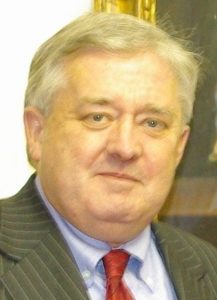
Adrian Hardiman.
Alongside Adrian Hardiman, Declan Costello was the finest Irish judge since the halcyon days of judicial activism in the 1960s and 1970s. Alas figures of that calibre are not evident on the judicial benches today. I fear the intellectual decline is irreversible, which represents a threat to decent governance of the state.
We are all products of our time and looking back on history we enjoy the benefit of hindsight. Declan Costello was a great man, with flaws. He had a quiet charm and displayed a courtly graciousness towards others. His brilliant mind was activated by a concern for social justice and, crucially, he possessed a sense of humour.
Within the establishment his intellectual calibre was a form of subversion, meaning he was always the Man Who Would Be King, but never the king. There was nevertheless a certain contradiction between his progressive, even transgressive, instincts as a politician and the reactionary tendencies he displayed as a judge.
The Just Society document stands unsurpassed as one of the last political statements of substance on social reform in Irish history. It displays a coherent vision for a better Ireland that politicians would do well to take off their book shelves today.
[i] Ciara Kelly, ‘Michael Sweetman and the Just Society’, from The Widest Circle: Remembering Michael Sweetman, Edited by Barbara Sweetman-FitzGerald, A&A Farmar, 2011 p.69

